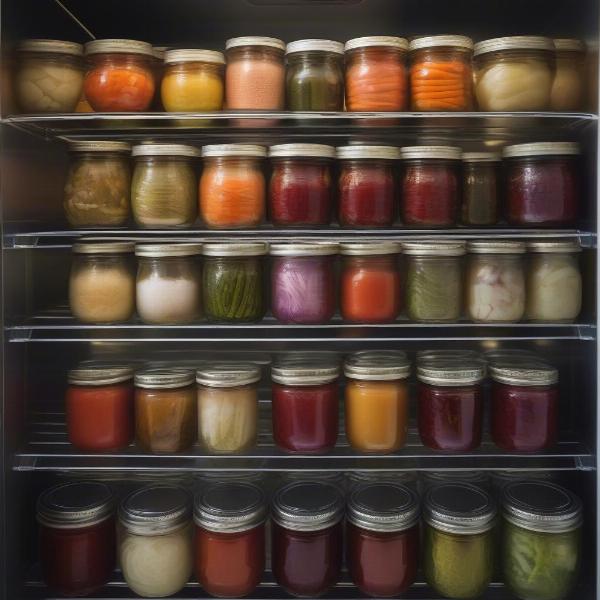Fermenting vegetables for dogs is gaining popularity as a way to enhance their gut health and overall well-being. This process offers a wealth of potential benefits, from boosting digestion to strengthening the immune system. This comprehensive guide explores the what, why, and how of fermenting vegetables for your canine companion, providing practical advice and expert insights to help you make informed decisions about your dog’s nutrition.
Why Ferment Vegetables for Your Dog?
Just like humans, dogs can benefit from the probiotic power of fermented foods. Fermentation is a natural process where microorganisms like bacteria and yeast convert sugars into acids, gases, or alcohol. This creates an environment rich in beneficial bacteria, also known as probiotics, which are crucial for a healthy gut. These probiotics contribute to improved digestion, enhanced nutrient absorption, and a strengthened immune system. Fermented vegetables also offer a unique flavor profile that many dogs find appealing. Could fermented vegetables be the key to a happier, healthier pup?
Choosing the Right Vegetables for Fermentation
Not all vegetables are created equal when it comes to fermentation. Some excellent choices for canine fermentation include carrots, cucumbers, green beans, and cabbage. Avoid using onions, garlic, and grapes, as these are toxic to dogs. Organic vegetables are preferred as they are free from pesticides and chemicals that could interfere with the fermentation process.
The Fermentation Process: A Step-by-Step Guide
Fermenting vegetables for your dog is surprisingly simple. Here’s a step-by-step guide to get you started:
- Prepare your vegetables: Wash and chop your chosen vegetables into bite-sized pieces.
- Prepare the brine: Dissolve salt in non-chlorinated water. The salt concentration is crucial for a successful ferment.
- Pack the jar: Tightly pack the vegetables into a clean glass jar, leaving an inch of space at the top.
- Pour the brine: Cover the vegetables completely with the brine, ensuring they are submerged.
- Ferment: Leave the jar at room temperature for 2-7 days, depending on the vegetables and desired level of fermentation.
Introducing Fermented Vegetables to Your Dog’s Diet
When introducing fermented vegetables, start with small amounts and gradually increase the portion as your dog adjusts. Monitor your dog for any digestive upset, such as gas or loose stools. If you notice any adverse reactions, discontinue feeding and consult your veterinarian.
Safety Precautions and Considerations
While fermented vegetables offer many benefits, it’s important to be aware of potential risks. Over-fermented vegetables can spoil and cause digestive issues. Always ensure you’re using fresh, high-quality ingredients and following proper fermentation procedures. If you’re unsure, consulting with a holistic veterinarian or canine nutritionist can provide valuable guidance.
How to Store Fermented Vegetables
Once the fermentation process is complete, store the jar in the refrigerator to slow down the fermentation and extend its shelf life. Properly stored fermented vegetables can last for several months.
 Storing Fermented Dog Food
Storing Fermented Dog Food
Conclusion
Fermenting vegetables for dogs can be a rewarding way to boost their health and happiness. By following these guidelines, you can safely introduce this nutritious and flavorful food into your dog’s diet. Remember to always prioritize your dog’s individual needs and consult with a veterinarian if you have any concerns.
FAQ
- How much fermented vegetables should I give my dog? Start with a small amount and gradually increase as your dog tolerates it.
- Can I ferment any vegetable for my dog? No, avoid toxic vegetables like onions, garlic, and grapes.
- What are the signs of over-fermentation? An unpleasant smell, mold growth, or a slimy texture.
- Can I feed my dog fermented vegetables every day? Yes, in moderation.
- What if my dog doesn’t like fermented vegetables? Try mixing it with their regular food or offering different fermented vegetables.
- Can puppies eat fermented vegetables? Yes, but introduce them gradually and in small amounts.
- Where can I get more information about canine nutrition? Consult with a holistic veterinarian or canine nutritionist.
ILM Dog: Your Partner in Canine Care
ILM Dog is your comprehensive resource for expert advice and reliable information on all aspects of dog care. We offer a wealth of knowledge on breed selection, health and medical care, training, nutrition, grooming, and much more. Whether you’re a new dog owner or a seasoned expert, ILM Dog is dedicated to helping you provide the best possible care for your beloved companion. Contact us today to learn more! Email: [email protected], Phone: +44 20-3965-8624. We’re here to support you every step of the way.